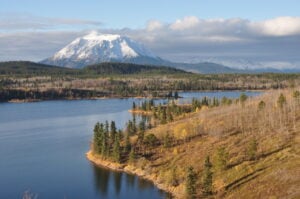Global leaders crossed the COP27 finish line on Sunday with a landmark agreement on compensation for poor nations bearing the brunt of the climate crisis, but a lack of progress on emissions-cutting measures that would tackle the cause of the emergency head-on.
The United Nations climate talks in Sharm el-Sheikh, Egypt remained in deadlock late on Friday, with a deal finally reached in the wee hours of Sunday morning. In a watershed moment for global climate politics, negotiators from nearly 200 countries agreed to establish a fund that would help rebuild the infrastructure of countries devastated by extreme weather events.
It’s a decision that Steven Guilbeault, Canada’s Minister of Environment and Climate Change, hailed as “historic.”
“Canada came to COP27 having laid the groundwork for a robust discussion on loss and damage, pushing to ensure it was an agenda item, something that has never happened in the three decades of COP,” he wrote in a statement. “[The conference] has shown us that the world can achieve progress even during very challenging times.”
The deal didn’t come without criticism, though, as the summit ended without a final agreement that would commit member states to a complete phaseout of fossil fuels. Over the two-week conference, Canada also ruffled some feathers by including representatives from the oil and gas sector in its delegation. Globally, there were more than 600 fossil fuel lobbyists in attendance.
Their strong presence at this year’s conference, which was 25 per cent larger than last year’s, raised the eyebrows of Tzeporah Berman, chair of the Fossil Fuel Non-Proliferation Treaty.
“We shouldn’t have fossil fuel companies at the table in the discussion of how we’re going to manage the wind-down of their industries,” said Berman, adding that the fossil fuel industry is holding the world back from achieving ambitious agreements to address climate change. “If you have incumbents who stand to benefit from inaction, then they should not be at the table.”
Climate scientists have repeatedly warned that if the Earth warms more than 1.5 degrees Celsius above pre-industrial levels, the planet will experience catastrophic changes to its natural systems, including widespread severe drought in some places, flooding in others, more extreme and long-lasting heat waves, and large-scale loss of habitable land.
Already, Canada’s northern communities are feeling the direct effects of climate change. In the Yukon, there has been a progressive decline of salmon and caribou populations. This past summer, Fisheries and Oceans Canada reported just over 12,000 Chinook salmon crossed into Canada – far below the 10-year historical average of around 52,000.
For Carissa Waugh, who also goes by the Northern Tutchone name Ékè Éwe, this decline has been devastating. She was among several Indigenous and youth delegates from Yukon and the Northwest Territories at COP27, where she represented the Yukon First Nations Climate Action Fellowship.
“As a kid growing up, we’d always go on the boat with our Papa and he would teach us how to put the net out there, how to pull the salmon out with care and bring it back to our grandma,” said Waugh. “With the decline in salmon numbers, we haven’t set up the net in quite a few years now. We are losing that part of our culture, part of who we are in my nieces and nephews. They’ve never got to experience that.”
And without immediate climate action, they likely won’t. The planet has already warmed by an average of 1.1 degrees Celsius, with Earth currently on a trajectory to warm by 2.1 to 2.9 degrees Celsius by the end of this century, according to a report by the United Nations Framework Convention on Climate Change. Ensuring the planet doesn’t exceed the 1.5 degree threshold requires rapid and deep cuts to greenhouse gas emissions, with Canada aiming for a reduction target of 40 percent below 2005 levels by 2030 and net-zero emissions by 2050.
Although the presence of oil and gas industry representatives of COP27 drew the ire of activists, including Berman, having industry participate in talks about ways to achieve decarbonization is essential to finding solutions, argues Mark Cameron, vice-president of Pathways Alliance, which represents Canada’s six largest oil sands producers.
“We are trying to be leaders in emissions reductions,” said Cameron, explaining that his group was in Sharm El-Sheikh to learn from others and talk about their own plans to reduce emissions by 22 million tonnes per year by 2030. One of the steps Pathways Alliance is taking, for example, is spending $16.5 billion before 2030 on a massive proposed carbon capture and storage facility near Cold Lake, Alta. [Canadian Geographic will publish a deep dive into the viability of carbon capture and storage as a solution to runaway greenhouse gas emissions in our January/February 2023 issue. — Ed.]
“You cannot solve these problems without talking to the industrial sectors that are responsible for emissions because the only people that can cut emissions in cement, steel, fertilizer, or oil and gas are the people involved in those industries,” said Cameron. “The oil sands [have] been part of the problem, but that also means we’re central to the solution.”
So far, the federal government has resisted calls from environmental groups to impose a production cap on the oil and gas sector. Asked why, Guilbeault said a major reason was the provinces and territories, which have jurisdiction over natural resources, would likely mount a legal challenge.
“Even if we put forward the most ambitious regulations one can think of, if we lose in the courts, it doesn’t serve anyone, only those that would want to prevent us from going forward,” he said in a phone interview.
Guilbeault remains optimistic that Canada can achieve its net-zero and biodiversity conservation targets. “We will keep up the momentum as we head to the UN Biodiversity COP15 in Montréal next month and rally for ambitious commitments to protect our natural world,” he said.





